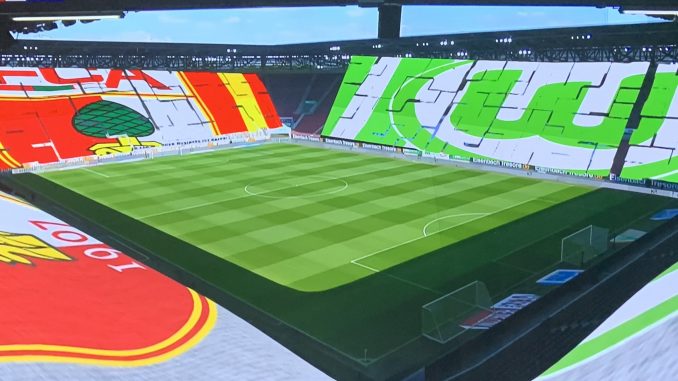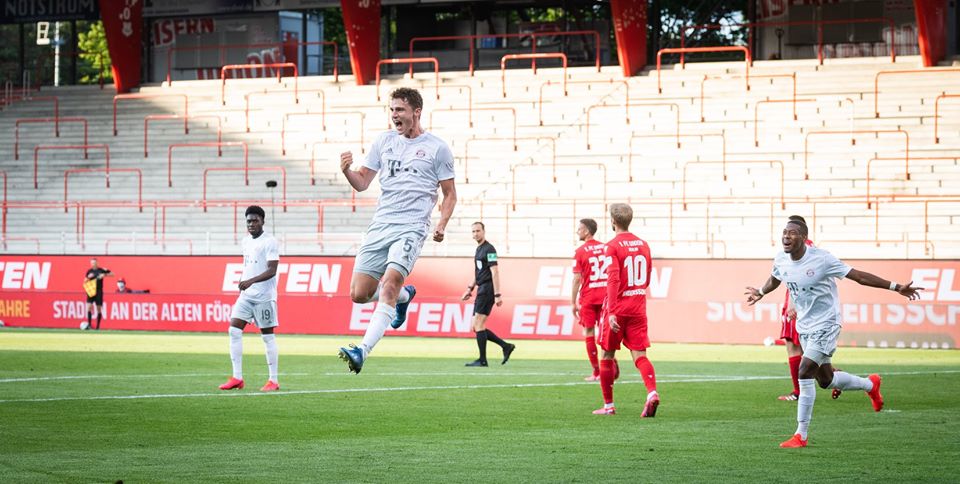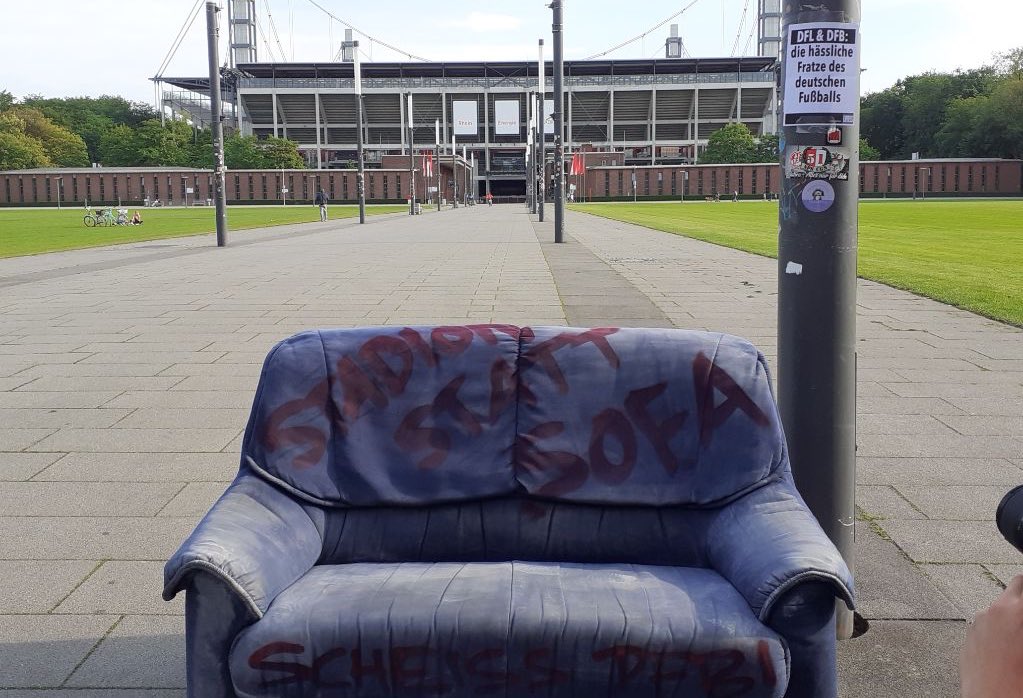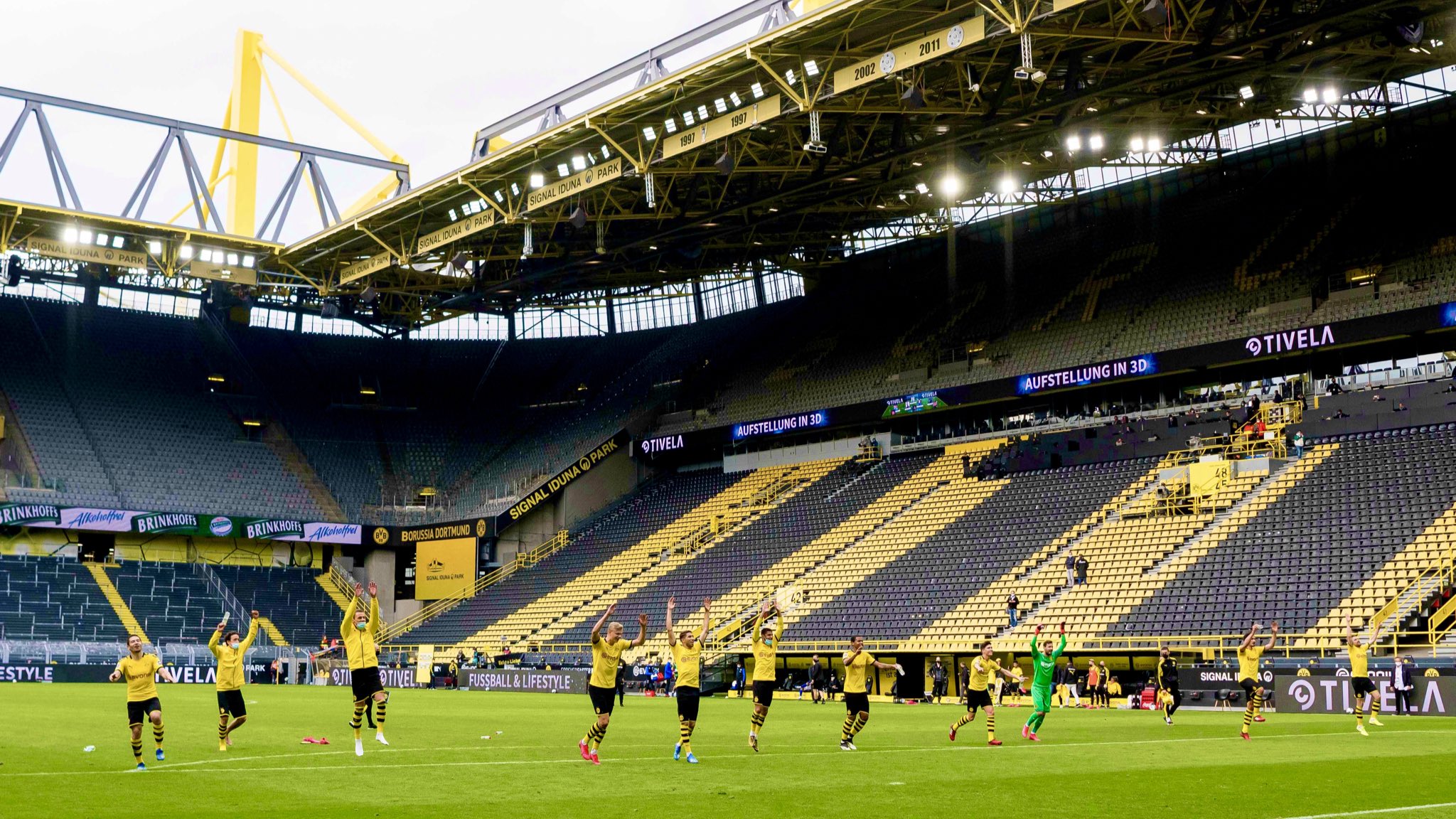
Imagine it: Bayern Munich host Barcelona at the Allianz Arena. 75,000 fans have gathered to sing and cheer on their teams, but the noise of the crowd far exceeds the number of tickets sold, because it also includes the sound of millions watching across the globe — in living rooms and local pubs, at impromptu watch parties, and sponsored events — and the voices of those fans are layered into the live audio feed to be transmitted right back to the viewer in an endless, cacophonous loop.
For all the TV viewer knows, the fans in the stadium might be silent or may not even be there at all, and the illusion of people filling the stands is just that: an illusion created through AR to enhance the viewing experience. It no longer matters, because technology has made it possible to cheer on your team, literally, from anywhere in the world. In this imagined world, you can even pay for a Premium VR Experience™ and thereby transport yourself right into the stands to watch the game surrounded by thousands of fellow virtual fans. “Everyone deserves to experience matchday at the Allianz,” the Bayern chairman says in a prerecorded message as your VR set loads. “So we are excited to welcome you here today, wherever in the world you may be.”
I began writing this article in November 2018, partly to discuss the advancement of VR technology, but mostly in response to leaked documents suggesting that a European Super League — the continent’s biggest clubs disregarding sentiment and geographical sense to compete only among each other for a profitable, year-round spectacle—may be imminent and inevitable. I tried to imagine a future of football so divorced from locality that fan support would primarily exist across distances in augmented or virtual reality. I could not predict that a global crisis would put the question of AR front and center for professional football in the year 2020.

As the world watched the Bundesliga restart last weekend in empty stadiums, Sky Sports offered viewers an option to switch their audio track from the eerily silent live feed to prerecorded noise of fans chants and crowd reactions. The English Premier League is now exploring options to enhance the “behind closed doors product” so that TV viewers can enjoy the football, when it returns, with the comfort of usual matchday atmospheres and as little reminder as possible that anything at all is amiss. Topics on the table include prerecorded fan noise, of course, but also CGI fans filling the empty stands. OZ Sports is one such company ready to provide the technological power to create an alternate, augmented reality for television so that football played during a pandemic can look and sound as much as possible like football during normal times.
The technology on the table is pretty amazing. The product would not only augment telecasts with CGI to make empty stadiums appear full, but also add a personal touch by allowing fans to choose their own avatars to appear in the empty seats. The product app would furthermore capture the audio of fans responding to the game in real time, aggregate it, and transmit the sound back to mimic the reactions of a live crowd. One could imagine its uses beyond sports being forced to resume during extraordinary times. Low attendance or lacklustre atmosphere can be touched up to appeal to TV viewers. Another revenue opportunity opens: pay to virtually connect to games happening across continents and overseas. And organized protests or boycotts of games might become functionally meaningless.
What appears superficially as an extraordinary measure for extraordinary times might be better contextualized in the on-going struggle between Germany’s football supporter groups and the DFB and DFL. Search “Bundesliga fan protests” and you will find a long list of bones of contention, from Monday night kickoffs to the 50+1 rule, to pyrotechnics, to police action against match-going fans, and more. But at the heart of it all is a question of commercialization, of whether professional football is primarily a product or something that belongs to a club and community. The possibility of Geisterspiele touched-up by AR is another chapter in the long saga, and it is one that both highlights old truths and new quandaries.
The move to restart competition in empty stadiums and further discussions on augmenting match broadcasts to make the product more appealing obviously prioritize the TV viewer over the match-going fan. Certainly, it’s true that large-scale social and sporting events cannot occur safely during a pandemic. But it’s also true that the DFL authorized the return of Bundesliga and 2.Bundesliga against the express wishes of many supporters groups throughout Germany. For instance, on the day of the closed-door match against 1. FSV Mainz 05, fans of FC Köln postered the city with flyers decrying “professional football decoupled from the rest of society.” They also dropped off a couch at the empty stadium to protest the ghost games being played for TV audiences.

“Without the ever-growing commercialization, which we’ve been criticizing for years, and the growing importance of TV money which came as a result, we wouldn’t be in this situation now.” Thus reads the statement (as translated by Felix Tamsut) by SC Freiburg ultra groups Corillo and Synthesia against the Bundesliga restart . “You wouldn’t have turned to the TV industry for their millions for being able to afford wages of millions, or for paying your bank credits, should you have managed your finances responsibly . . . Football must change radically. We cannot return to normal, as the previous situation was anything but normal.”
Werder Bremen fans put the sentiment rather succinctly several years back:
PHOTO | "Football is for you and me – not the fucking pay tv"
SV Werder Bremen ultras today pic.twitter.com/MbA8K7bAPR
— Antifa_Ultras (@ultras_antifaa) September 30, 2018
As SGE supporter group Nordwestkurve Frankfurt points out in their statement criticizing the resumption of competition behind closed doors, the lively fan culture is the Bundesliga’s biggest selling point. Perversely, the labor of match-going fans — in tifos and chants and the intense, taken-for-granted atmosphere of every Bundesliga game — has been sold to overseas TV audiences, and meanwhile the fans themselves are being sold out by the very thing that makes the league so attractive and marketable. The commodification of fan support is glaringly obvious in the league’s marketing tagline, “Football As It’s Meant To Be.” And now the possibility of AR in telecasts points squarely to the question of whether that commodification can be stopped at the water’s edge.
When I began writing on the future of football fan support, it was primarily a thought exercise. An ¨act of God¨ has since paved the way for technology that could, conceivably, make match-going support obsolete. Football, as an event rife with presence and locality, becomes a historical artifact in a world where broadcasters can manufacture the matchday experience with all its immediacy through AR and VR for the end consumer. In that world, it might not matter whether match-going fans consent to participate and, through their labor, create the atmosphere, the sense of grandeur, of something bigger, that prompted viewers to turn on the TV in the first place.
This is not to say that football should only be for local fans or that the Bundesliga becoming more widely available for TV audiences is an inherently bad thing. As someone living in the United States, I have personally benefited from the TV deals that allowed me to watch Bundesliga (and 2.Bundesliga) games every week without having to resort to spotty, illegal streams. And among all the reasons why, the intense fan support has always been my number one reason for loving the Bundesliga. A foreign fan constantly skirts the trap of fetishistic voyeurism when professing something like this, due to the very nature of how they experience the league (i.e. consumption), but the mythos of Bundesliga fans is more than just armchair cultural tourism. The lively culture and on-going protests are object lessons in participatory labor, collective action, social responsibility, and praxis, and they go beyond just football as weekend entertainment. Of course, it doesn’t hurt that the league is madcap entertaining and, thanks to match-going fans, always enjoyable.
It is a Gordian knot that lashes the Bundesliga’s intense marketability to the fans who made it so — and who now, apparently, can be replaced by technological advancements for the benefit of TV audiences. The restart, the ghost games, and curated telecasts are all part of the question of whether football’s purpose is to grow as a business, to sell more products to more consumers, or to serve local supporters. I wonder if in ten years’ time we’ll look back on this and identify it as the moment when football became, finally and completely, all about the television product.
No supporters required.




1 Trackback / Pingback
Comments are closed.